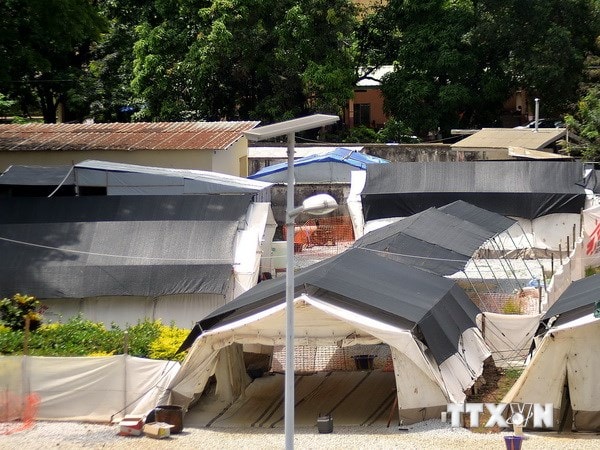Many villages in West Africa were completely wiped out by the Ebola epidemic.
 |
| The isolation area for treating Ebola patients at Donka Hospital, Guinea. (Source: AFP/VNA) |
Dr Eyal Reinich, at the centre of the Ebola outbreak in Guinea, said the outbreak in West Africa was worsening, with entire villages wiped out and bodies lying in the streets.
"I have been working with humanitarian aid groups for the past 12 years and have been in Ebola areas four times, three times in Guinea, but this outbreak is the worst," said the Israeli doctor with Doctors Without Borders.
The disease, which is currently spreading across Guinea, Liberia and Sierra Leone, has a mortality rate of up to 90% and there is no cure.
Speaking to Ha'aretz, Dr. Reinich was not optimistic about the possibility of controlling the outbreak of this incurable disease. He affirmed that this was the most toxic Ebola virus he had ever encountered and the actual death toll was much higher than what was announced.
Dr Reinich, who has been in Guinea since May 2014, said: "Whole villages have been wiped out. You go to villages and you just find dead bodies. You don't know if all the people in the village are dead or if some have fled. This is a virus that is 90% fatal and we don't know the health conditions of those who have fled."
Panic in affected countries has made the disease virtually impossible to control, at a time when other diseases such as Lassa virus and malaria are also raging in the region.
People in the villages are fleeing as if it were a civil war, making it easier for the disease to spread. They are escaping into the forests and other places and becoming vagabonds.
According to Dr. Reinich, even in some places, relief workers such as those from the local Red Cross panicked and ran away.
Meanwhile, in the cities, people are afraid to leave their homes. All social events and festivals are canceled, entertainment venues and sports clubs are closed, markets are deserted and many airlines have canceled flights. Travelers who must come here, often businessmen, are thoroughly checked at the airport. But when they arrive, they are locked in their hotel rooms.
In Liberia's capital Monrovia, many dead bodies lie in the streets. "The fear on the streets is terrible," said Dr. Reinich. "If a person collapses in the street, people react in panic and no one helps them."
In villages, people have lost faith in Western aid agencies. People, especially in tribal areas, do not allow aid workers near them, fearing that contact will spread the disease. Despite their fear of infection, many people with symptoms do not go to aid agency clinics.
Doctors are trying to identify as many people as possible who carry the virus and treat the 10% of patients who survive without infecting themselves.
Aid workers protect themselves with plastic suits, gas masks and chlorine spray. Doctors often burn the suits and mobile clinics to destroy traces of the virus.
"The rainy season is delaying work and making it easier for the virus to spread," Dr. Reinich said. "Although leaders have decided to close borders, they are actually open. All the conditions for Ebola to spread are more evident."
According to VNA






